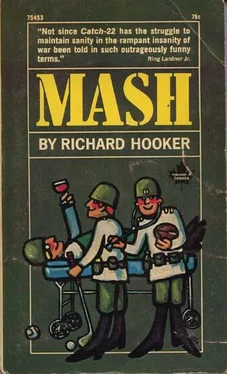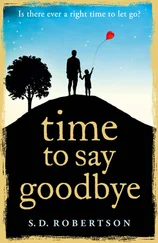“What’s the score now?” Hawkeye asked.
“A major case on every table and ten more that are bad and about thirty that can wait till things quiet down.”
“Who’s ready?”
“That one over there,” said Henry, pointing.
That one turned out to be a very black Negro who was one of Ethiopia’s contributions to the UN forces. Hawkeye repaired the damage to the liver and bowel there just in time to assist Trapper John who had gone into another chest. From Trapper he went to help Duke remove the right kidney and a section of colon belonging to a Corporal Ian MacGregor.
“What type we got here?” Hawkeye asked the Duke.
“Don’t y’all know you’re operating on a member of Princess Patricia’s Canadian Light Infantry?” the Duke said.
“Finest kind,” Hawkeye said.
That was the way they played it, day after day. As soon as someone finished a case he had to assist elsewhere until another case of his own was brought in. Then, briefed by Colonel Blake, he’d step in and do his best. When the last of the serious cases was allotted, the surgeons, as they became free, would start working on the minor things—debridement of extremity wounds, some with fractures, some requiring an amputation of a finger, a toe, a foot or a leg, but minor as compared with what had gone before. Meanwhile they, and everyone else, would listen for, and dread, the sound of the six o’clock chopper.
The six o’clock chopper, either morning or evening, was always unwelcome because the very fact that the pilot was risking the trip in half-daylight meant that the soldiers lying in the pods were seriously wounded. So twice each day, at dawn and at dusk, as six o’clock approached, everyone—surgeons, nurses, lab technicians, corpsmen, cooks and mostly Lt. Col. Henry Blake—would listen, and during the time of the Great Deluge, they would hear, not one six o’clock chopper but three or four.
“What the hell is going on up there, anyway?” Colonel Blake asked no one in particular one 6:00 p.m., the roar of the choppers filling the postop ward, where the colonel was assessing results with the Swampmen.
“The Chinks,” Trapper John said, “are obviously holding a Gold Star Mothers membership drive.”
“And it’s up to us,” Hawkeyc said, “to stamp out that organization, so let’s get to it.”
“Right,” Duke said. “We can fix ’em just as fast as they can shoot ’em.”
“Right, hell,” Henry said. “You guys can’t go on like this forever. You haven’t had any sleep.”
“Right,” Duke said.
“How the hell do you feel?” Henry said.
“Better than the patients,” Duke said.
“Then what the hell are you doing, standing around here?” Henry said.
The new group Was truly international. Hawkeye drew a Turk, and repaired his lacerated colon. Duke took off the right leg of a Puerto Rican kid, portions of whose femur, shattered by a mortar up on Pork Chop Hill, had punctured the chest of his fox hole buddy, who was now on the next table under Trapper’s knife. When Trapper finished there, he closed the ruptured diaphragm of a Chinese prisoner of war, while Duke assisted the Professor of Vascular Surgery who was trying to save the left leg of a Netherlands private by fashioning an arterial graft out of a segment of vein from the other leg, and Hawkeye, with Pete Rizzo assisting him, went into the belly of an Australian.
“Dammit,” he said, after about a half hour of it, “we just need more hands.”
“I know,” Pete Rizzo said, “but I only got two.”
“Knocko!”
“Yes, sir?” Captain Bridget McCarthy answered.
“Put on a pair of gloves and help us for a few minutes, will you?”
“Can’t, Hawk,” Captain Bridget McCarthy said. “I’ve just got too much to do already.”
“Then find somebody else.”
“Yes, sir.”
Ten minutes later, Hawkeye was aware of the help— gowned, capped, masked and gloved—at his left. Without looking up he reached over and put the new assistant’s hands on a retractor.
“Pull,” he said.
“How, Hawk?” he heard Father Mulcahy say. “This is a little out of my line.”
For days, now, and for nights, too, Dago Red had been doing his part. All day and all night he had been going from patient to patient—black, white, yellow—friend and foe. Some of them didn’t know who he was, but they all knew the side he was on. A confident patient does better in surgery, and so does a confident surgeon, and Dago Red had the right words for both.
“Just pull,” Hawkeye was saying now. “Right there, and toward you. More. Good. And when we get out of this you can put in the first sterile fix in the history of surgery.”
And still they came. Bellies, chests, necks, arteries, arms, legs, eyes, testicles, kidneys, spinal cords, all shot to hell. Win or lose. Life and death. At the beginning of it, all of the surgeons, and particularly the Swampmen, had experienced a great transformation. During periods of only sporadic employment they often drank far too much and complained far too much, but with the coming of The Deluge they had become useful people again, a fulfilled, effective fighting unit and not just a bunch of semi-employed stew bums stranded in the middle of nowhere. This was fine, as far as it went, but it was going too far. By the end of the second week they were all wan, red-eyed, dog-tired and short of temper, and it was obvious to all of them that their reflexes had been dulled and that their judgment had sometimes become questionable.
“This can’t go on,” Lt. Col. Henry Blake was saying at five forty-five one afternoon, for the fiftieth or sixtieth time within the last three or four days. “Goddam it and to hell, but this just can’t go on.”
Henry was standing, with the Swampmen, just outside the door of the postop ward. Once again, somehow, they had managed to take care of all the major cases, and the debridements and fractures and amputations were now being handled by others. They had ostensibly stepped out for a smoke, but each knew that they were all there to post a watch to the north and hope against hope against the appearance of the six o’clock choppers.
“It’s gotta end sometime,” Henry was saying. “It’s gotta end sometime.”
“All actions and all wars,” Trapper John said, “eventually do.”
“Oh, hell, Mclntyre,” Henry said, “what good is that? When? That’s the question. When?”
“I don’t know,” Trapper said.
“But who the hell does know?” Henry said. “I call three times a day, but those people in Seoul don’t know a damn thing more than we do. Who the hell does know?”
“I don’t know,” Hawkeye said, “but maybe Radar …”
“O’Reilly, sir,” Radar O’Reilly said, at the colonel’s elbow.
“Goddam it, O’Reilly,” Henry said, “don’t do that!”
“Sir?”
“What the hell are you doing out here, anyway?”
“I thought you called for me, sir,” Radar said.
“Look, O’Reilly … ,” the colonel started to say.
“Look, Henry,” Hawkeye said, “maybe I’m going off my nut …”
“Maybe we all are,” Henry said.
“Then maybe Radar can help us.”
“We are crazy,” Henry said, shaking his head. “We’re absolutely mad.”
“Look, Radar,” Hawkeye said. “What we . ..”’
“Let me handle this, Pierce,” Henry said. “O’Reilly?”
“Sir?”
“Now don’t lie to me …”
“Why, sir! You know that I never …”
“Never mind that, O’Reilly,” Henry said. “I don’t want to listen to any of that, but I want to know something.”
“What, sir?”
“Goddam it,” Henry said, turning to the others. “I haven’t really gone out of my mind, have I?”
Читать дальше












